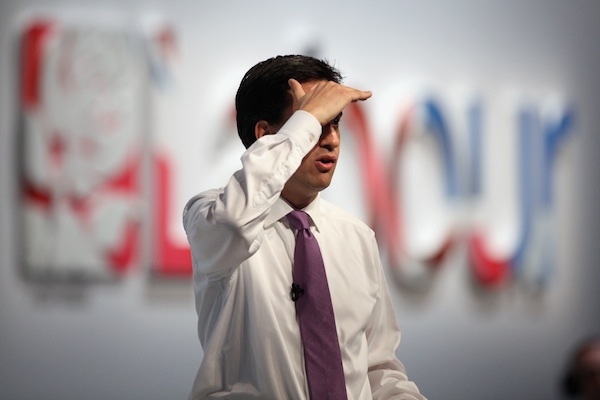Ed Miliband’s speech in Manchester next week is going to be one of the toughest gigs of the party conference season. As James writes in his column this week, the Labour leader needs to give the country a glimpse of what he would be like as Prime Minister. Alan Johnson agrees: in a piece for the Guardian today, the former shadow chancellor says Miliband has ‘to do more to demonstrate that he is a leader’. Johnson writes:
‘But he knows better than anyone that an opinion poll lead is not enough. In any case, the same polls still show David Cameron being preferred as prime minister. While I don’t believe that a prime minister who is more popular than his party can deliver an election victory, it does suggest that Ed Miliband has to do more to demonstrate that he is a leader.
‘In part this is the age-old problem of opposition parties who struggle to make the news and a leader who has never been tested in the difficult job he aspires to. It’s also the case that Labour has, rightly in my view, held back on making significant policy pronouncements that themselves can define a leader. I would be surprised if the Manchester conference is used to set out major elements of the party’s manifesto for the next general election. We are not at the point in the electoral cycle where we need to fire too much of our ammunition, but we do need to have some of it ready.’
Johnson’s point about policy is interesting. When the party launched its policy review in autumn 2010, the original plan was for it to report back to this year’s conference. Frontbench spokespeople told me at the time that they were worried they would be left with nothing to throw back at ministers during departmental questions, and that they would have little power to combat some of the government’s radical reforms because the party could offer no coherent alternative.
Those worries have been proven true: Labour tied itself into complete knots over the £26,000 benefit cap in the Welfare Reform Bill, for example. Initially junior welfare spokeswoman Karen Buck, who has specialised in welfare for years, said they would oppose the cap when it came to report stage in the Commons. Then, suddenly, the party went quiet, failing to table a single amendment on the matter, and rejecting one calling for the cap to be scrapped from John McDonnell. This was Liam Byrne’s idea: he realised that every piece of polling suggested that voters loved the idea of capping benefits for workless families, and that opposing it would make Labour look awfully out of touch. But then his work and pensions team changed tack as the Bill was starting to grind its way towards becoming law in the House of Lords. Suddenly they decided they would oppose the legislation, and they also started vaguely talking about a regional cap to mitigate the effects. The whole thing was a mess.
Similarly, Stephen Twigg has struggled to combat Michael Gove, partly because early comments he made about some of the government’s education reforms were knocked back by the Labour leadership. He was forced to retract his support for free schools, for example. Now he is struggling to get his voice heard at all on GCSE reforms because he has no policy foundations to launch an attack from. Would Labour try to scrap the English Baccalaureate if they came to power in 2015? In practice it would be nigh-on impossible, but Twigg hasn’t been able to concede even that.
The policy review is no longer being launched this autumn: sacking Liam Byrne as its chief and replacing him with Jon Cruddas has changed that. And it does seem premature to be setting out details: the last thing Miliband wants to do is write the next ‘longest suicide note in history’ by setting out his position too early. But his shadow ministers are struggling to articulate broad brush positions on government policy that is being scrutinised at the moment: some more definition on key areas would be helpful.







Comments